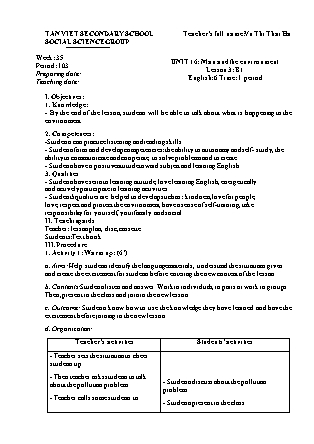Giáo án Tiếng Anh Lớp 6 (CV5512) - Unit 16: Man and the environment - Lesson 3: B1 - Vũ Thị Thái Hà

I. Objectives:
1. Knowledge:
- By the end of the lesson, students will be able to talk about what is happening to the environment.
2. Competences:
-Students can practice listening and reading skills.
- Students form and develop competencies: the ability to autonomy and self- study, the ability to communicate and cooperate, to solve problems and to create.
- Students have a positive attitude toward subject and learning English.
3. Qualities
- Students have serious learning attitude; love learning English, energetically
and actively participate in learning activities.
- Student's qualities are helped to develop such as: kindness, love for people,
love, respect and protect the environment, have a sense of self-training, take
responsibility for yourself, your family and social.
II. Teaching aids
Teacher: lesson plan, disc, cassette
Students: Text book.
TAN VIET SECONDARY SCHOOL Teacher’s full name:Vu Thi Thai Ha SOCIAL SCIENCE GROUP Week: 35 Period: 103 Preparing date: Teaching date: UNIT 16: Man and the environment Lesson 3: B1 English: 6 Time: 1 period I. Objectives: 1. Knowledge: - By the end of the lesson, students will be able to talk about what is happening to the environment. 2. Competences: -Students can practice listening and reading skills. - Students form and develop competencies: the ability to autonomy and self- study, the ability to communicate and cooperate, to solve problems and to create. - Students have a positive attitude toward subject and learning English. 3. Qualities - Students have serious learning attitude; love learning English, energetically and actively participate in learning activities. - Student's qualities are helped to develop such as: kindness, love for people, love, respect and protect the environment, have a sense of self-training, take responsibility for yourself, your family and social. II. Teaching aids Teacher: lesson plan, disc, cassette Students: Text book... III. Procedure 1. Activity 1: Warm up: (6’) a. Aims: Help students identify the language materials, understand the situations given and create the excitement for students before entering the new content of the lesson b. Contents: Students listen and answer. Work in individuals, in pairs or work in groups. Then, present in the class and join in the new lesson. c. Outcome: Students know how to use the knowledge they have learned and have the excitement before joining in the new lesson. d. Organization: Teacher’s activities Students’ activities - Teacher sets the situation to cheer students up. - Then teacher asks students to talk about the pollution problem. - Teacher calls some students to present in the class. - Students discuss about the pollution problem. - Students present in the class. 2. Activity 2: (10’) a. Aims: Help students identify, understand the situation and language materials. b. Contents: Learn and use language materials simply. c. Outcome: Work in individuals, work in pairs or work in groups. Students know how to use the knowledge they have learned. Then present in the class. d. Organization: Teacher’s activities Students’ activities - Teacher introduces the content of the lesson. - Teacher teaches the language materials. - Teacher asks students to read the words in chorus 3 times. - Teacher calls some students to read the words aloud. - Students listen to the introduction. - Students learn language materials. I- Languege materials. +destroy +wild animals +waste +burn +pollute +produce - Students read the words in chorus 3 times. - Students read the words aloud. Then write and rmember. 3. Activity 3: (16’) a. Aims: Help students use the knowledge to practice in the situation of the lesson. b. Contents: Listen, speak, read, answer the questions. c. Outcome: Work in individuals, work in pairs, experience in the situations. Students know how to use the knowledge they have learned. Then present in the class. d. Organization: Teacher's activities Students' activities - Teacher guilds and asks students to listen and read. - Teacher guides and asks Ss to listen and read B1 then answer the questions with a partner. - Teacher asks students to compare and cross-check the answers with a partner. - Teacher asks students to show the answer in the class. - Teacher checks and gives the correct answers. II-Practice. 1-Listen and read - Students listen and read. 2- Answer the questions with a partner. Then write them in . - Students answer the questions in pairs then show them on board. - Students compare and cross-check the answers with a friend. - Students show their answers. Answers: a-Because we are destroying their home and the environment. b-Gases are polluting the air. c-The pollution comes from the land, the rivers , the oceans/people. d- Trash is polluting the land, rivers and the oceans. - Students correct answers. 4. Activity 4: (10’) a. Aims: Help students use the knowledge to practice "do" and "not do". b. Contents: Read, answer the questions, practice as the requirements of the lesson. c. Outcome: Guide and ask students to practice in pairs, experience in the situations. d. Organization: Teacher’s activities Students’ activities - Teacher asks Ss to read and talk what can we help the environment then write the rules on board. + What should we do? + What should not we do? * Teacher guides and asks Ss to play with words. 3- Listen and read . - Students work with a partner to show what we can help the environment by the rules. DO: +Keep off the grass. +Save water +Collect paper, bottles and cans. DON ’ T: +Throw trash on the streets and in the country. +Pick flowers and damage trees. - Students listen and repeat the play with words in chorus.
Tài liệu đính kèm:
 giao_an_tieng_anh_lop_6_cv5512_unit_16_man_and_the_environme.docx
giao_an_tieng_anh_lop_6_cv5512_unit_16_man_and_the_environme.docx



